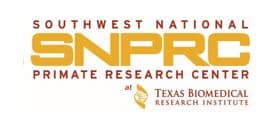
Dr. Kaushal is currently Director of the Center for Tuberculosis Research within the Tulane National Primate Research Center (TNPRC) in Covington, La. and Professor in the Department of Microbiology and Immunology at Tulane University School of Medicine in New Orleans, Louisiana. He will assume the Director position at SNPRC in January 2019 following Dr. Lanford’s retirement. Dr. Lanford, whose research has helped advance new therapies in the clinic for Hep B and the curative treatments now available for Hep C, will continue as a scientist at Texas Biomed.
“We are excited Dr. Kaushal will be joining the Texas Biomed and SNPRC team,” Dr. Schlesinger said. “He is a world-renowned researcher whose focus in tuberculosis and HIV, specifically using nonhuman primates in TB research, is a natural fit with the Institute’s long-term vision of becoming the world-leader in infectious disease research. His experience as Leader of the Tulane Tuberculosis Research Unit, managing both budgets and personnel for several multimillion dollar, grant-funded projects provides him the unique expertise and background necessary to guide SNPRC into a new era.”
Dr. Kaushal has built an illustrious career with more than 25 years of experience working to eradicate tuberculosis, which kills more than two million people worldwide each year and is one of the three major causes of death due to infectious diseases. Using the macaque nonhuman primate model, Dr. Kaushal’s lab tests new drugs against the disease and new vaccine candidates. His lab also aims to combine drug and vaccine candidates to combat drug resistant tuberculosis. Several of his research projects aim to understand the basic mechanism underlying how tuberculosis progresses and evades the human immune response. He explains that by understanding how TB misconfigures the immune system, scientists can develop more targeted pathways for treatment and vaccine options. A major focus of his research is to study the synergy between TB and HIV-AIDS. Better understanding these phenomena will advance both vaccine- and drug-development for these two catastrophic diseases.
“The opportunity to work in San Antonio is tremendous,” Dr. Kaushal said. “The community has a strong health science center and medical school, a network of higher education that fuels the engine of a research enterprise, strong non-profit organizations such as the Southwest Research Institute and is a vibrant, multicultural city. This is a place where technology, industry and supported research in infectious diseases can grow.”
Dr. Kaushal expressed excitement about the potential to lead new initiatives, as well as initiatives already in the works, such as the 2019 NHP Models of AIDS meeting next year. Hosted by SNPRC, the meeting is expected to bring international exposure to Texas Biomed, SNPRC and San Antonio, showcasing the region’s unique capabilities and assets.
He added that nonhuman primate research has been critical to many of today’s medical breakthroughs and will continue to be important as we strive to find therapies, vaccines and cures for diseases impacting us today and tomorrow. He found San Antonio to be welcoming of the resources SNPRC provides, and he is impressed with the philanthropic support in the city. While federal funding continues to remain flat and the cost of performing science increases, Dr. Kaushal added that greater private funding will be necessary to ensure that this critical, national resource is available and nurtured for the future of biomedicine and the health of both people and animals.
“Dr. Lanford and the SNPRC leadership team have advanced an outstanding program.” Dr. Kaushal said. “I am excited about the vision Dr. Schlesinger has laid out for the Institute, which calls for enhancing the primate facilities, growing high containment laboratory capabilities and building upon the great programs already in place that utilize nonhuman primate resources. Texas Biomed is in a unique position with both its primate center and high containment laboratories to make a lasting impact on human health. I look forward to working with the team to build upon the successes of the past and create more opportunity for the future.”
Dr. Kaushal expects to begin transferring his scientific program beginning in January 2019. Among the top-funded NIH scientists, Dr. Kaushal has served as principal or co-investigator on nearly 30 NIH-funded grants. He currently has 5 active R01 grants from the NIH and serves as co-investigator on three additional R01 grants. A Bill and Melinda Gates Foundation supported researcher, Dr. Kaushal will bring a portfolio of about $25 million in grant funding to SNPRC and Texas Biomed.
He has authored more than 94 journal publications that have been published, are in press, in review or in revision and has presented at more than 66 scientific conferences worldwide. He serves as a guest editor, reviewer and ad hoc reviewer for multiple scientific journals, including Nature Medicine, Nature Communications, the Journal of Immunology and Public Library of Science Neglected Tropical Diseases among many others. He currently serves as a full member of NIH’s AIDS-associated Opportunistic Infections and Cancer (AOIC) Study Section.
Dr. Kaushal has a Ph.D. in biochemistry & microbiology from the University of Delhi in India. Among his many professional affiliations, Dr. Kaushal is currently a member of the Infectious Diseases Society of America, the American Society for Biochemistry and Molecular Biology, the Bill and Melinda Gates Foundation Collaboration for TB Vaccine Discovery (CTVD), the Bill and Melinda Gates Foundation working group on Nonhuman Primate Models, and the AIDS Clinical Trials Group (ACTG).
Dr. Kaushal expressed his gratitude to Tulane University and the Tulane National Primate Research Center leadership for the support he has received the past 12 years as a faculty member there and wishes the entire TNPRC community the best in their future endeavors.